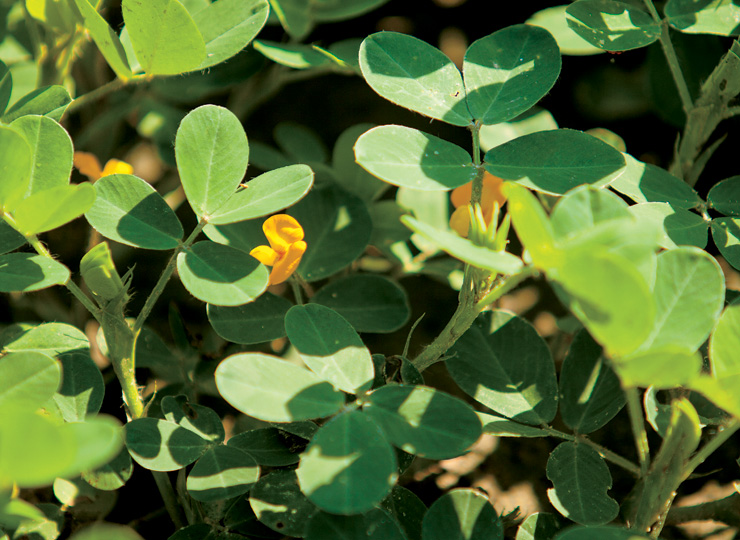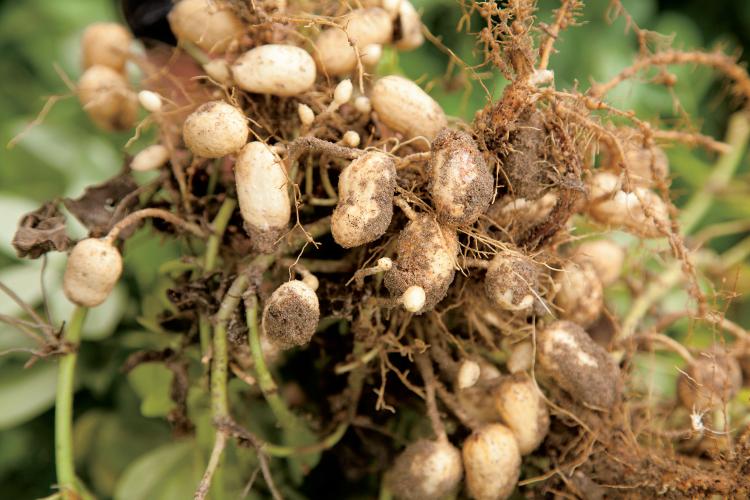Home > Georgia > Georgia Crops & Livestock > Go Nuts for Georgia’s Top-Ranking Peanut Industry
Go Nuts for Georgia’s Top-Ranking Peanut Industry

Georgians can be proud their state ranks first in U.S. production for the small but mighty peanut. The nut is one of the state’s “Big Three Ps,” – peanuts, pecans and peaches – with more than $400 million logged in peanut cash receipts in 2010 in the largest land area east of the Mississippi, according to USDA’s National Agricultural Statistic Service’s Georgia field office.
No one is prouder to lay claim to Georgia’s peanut notoriety than peanut producer T.E. Moye of Newton. A native Georgian, Moye and his family farm 1,800 acres, some of which have been in his mother’s family and his wife’s mother’s family since the Homestead Act allowed his family to stake a claim in 1839.
The farm employs one part-time and four full-time employees.
While their operation includes peanuts, corn, cotton, soybeans and a 200-head beef cow herd, Moye is especially happy with the crop rotation he’s developed to increase his peanut yield.
“We try to put three crops between a peanut crop,” Moye says. “We’ll plant peanuts one year, cotton the second, corn the third and a forage crop the fourth. We’ve found that rotating in that order decreases disease and increases peanut yields tremendously. We were pleased when our farm was recognized with the Southeastern Peanut Profitability Award in 2009.”

Peanuts boost Georgia’s economic health
Georgia grows half the peanuts produced in the nation, and peanuts are the fifth top commodity produced in the state.
“The economic impact to our state just from peanuts is tremendous,” Moye says. “Peanuts will generate $840 million of income for Georgia farmers in 2012, based on the peanuts planted and assuming we will be able to harvest them. That will generate three times the income for the state’s economy as farmers spend their money, which equals $2.5 billion for the Georgia economy.”
“Without the peanut industry, all the jobs that are generated by it would be affected,” he explains. “From the tractor driver to the chemical salesman to the peanut mill worker to the candy company that buys peanuts to make a Snickers bar, the trickle down impacts people. The retailers who sell farmers’ furniture to the clothing store that sells new clothes to the peanut mill workers’ children, there would be a huge negative economic impact on our state and citizens without the peanut commerce.”
The Georgia Peanut Commission reports about 70 Georgia counties produced nearly 2 billion pounds of peanuts in 2010. Fourteen thousand farms producing peanuts and about 4,500 active farmers help support approximately 200 peanut-related businesses contributing to more than 50,000 jobs in the state.

LMC is world’s largest peanut processor
Seventy-year-old LMC Manufacturing in Donalsonville wears the title of world leader in the peanut shelling process very well. The company’s longstanding equipment vitality is responsible for shelling 90 percent of the commercial peanut market.
Originally the H.M. Carter Manufacturing Company, “Home of the Famous ‘Carter’ Peanut Shellers,” LMC produces peanut shelling, sizing and blanching systems, including buying point operation systems. They also create processing structures for other industries such as tree nuts, seed and grain, beans, and recycling and rubber.
“We can custom design, build, deliver and install a complete peanut processing operation to customer’s specifications,” says Marcus Carter, sales manager. “For example, we manufacture equipment that processes peanuts into peanut butter and other confectionaries. Our products are made by dedicated and hardworking employees who are encouraged and empowered to make decisions, and who enjoy working in a family atmosphere.”
LMC’s equipment is recognized globally. Companies in industrialized nations including South and Central Americas, Australia, the Middle East and Europe are all customers of LMC.
“We are grateful for our worldwide base and the impact the business has for our home state,” Carter says. “We’re all about helping get the grown product out of the field and into an edible form.”

Importance of Agriculture
America enjoys an abundant, and most importantly, a safe food supply, and neither of those is by accident, Moye says. “The stand that American farmers must meet has been set very high and we, as farmers, are proud of the quality products we produce.”
Moye, his family, and their employees believe in the nutritious and economical value of peanuts as a staple food. “We support organizations like Peanut Proud that supplies peanut butter and mana (a peanut-based nutritional supplement) to starving children in undeveloped countries.”
“I want our leaders and the public in general to understand the necessity of the Georgia farmer, the importance of agriculture, and the economic impact of the whole agricultural economy on our state,” Moye says.



